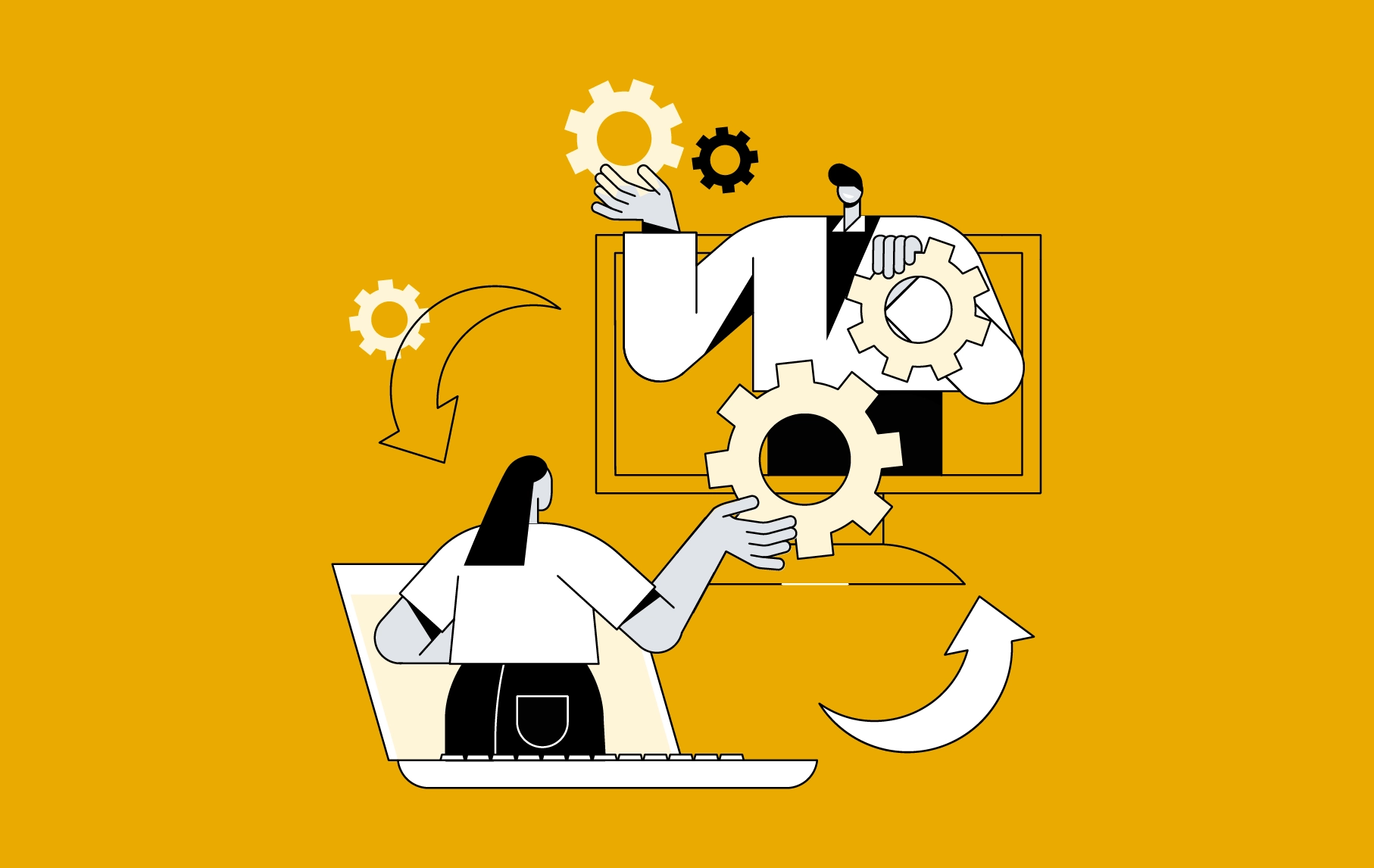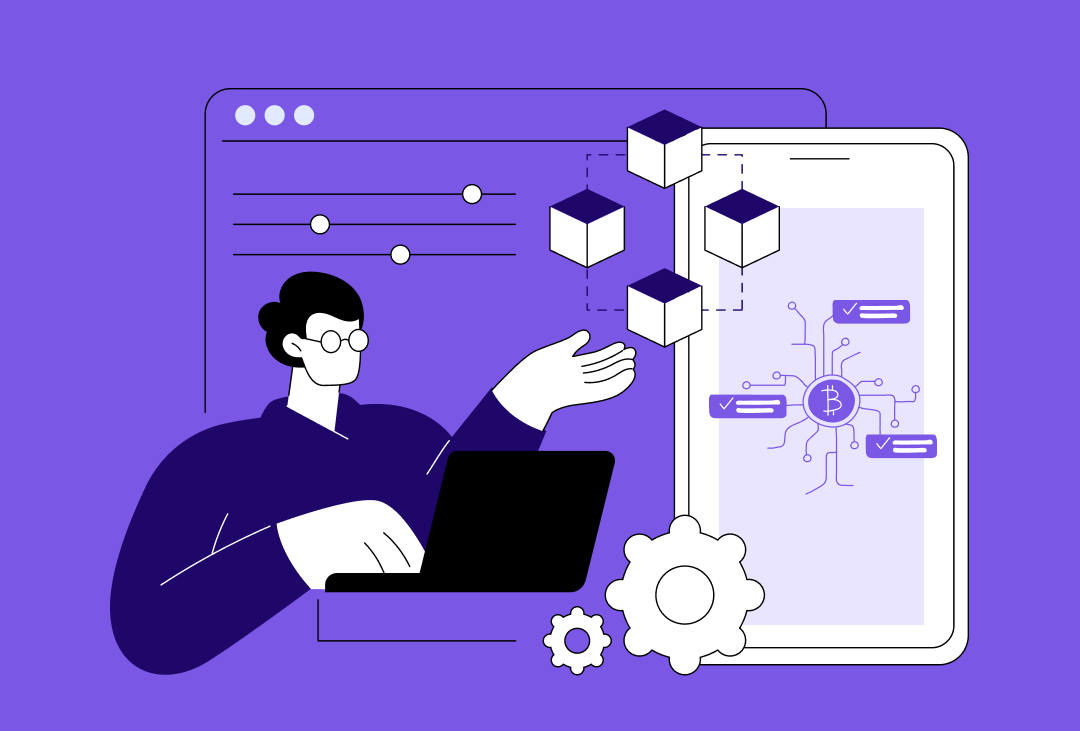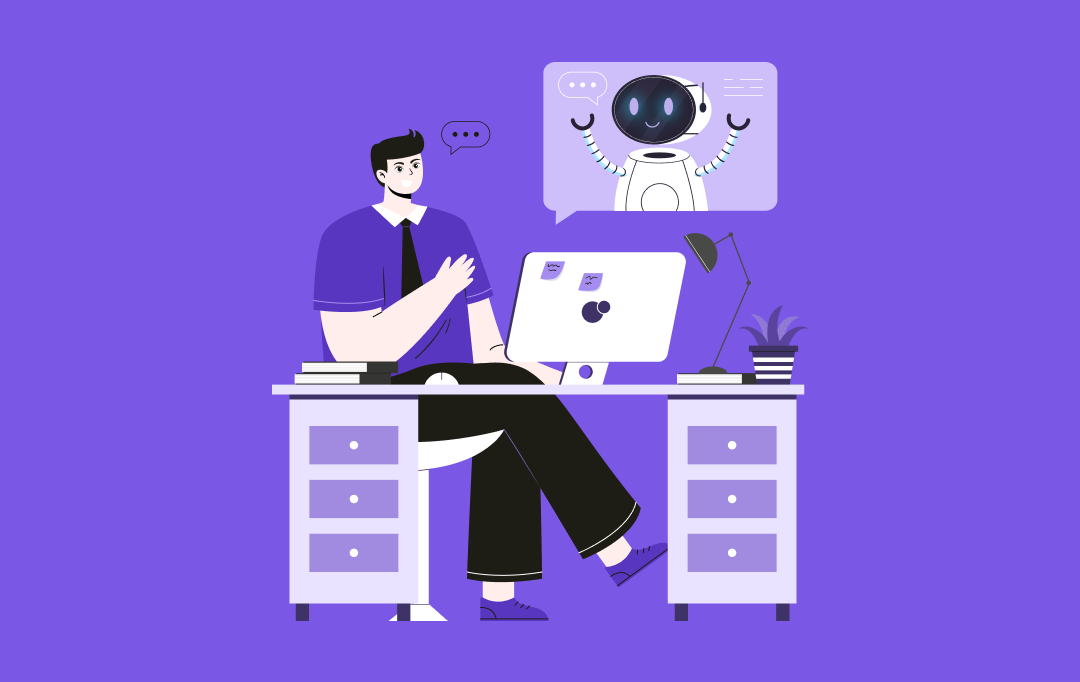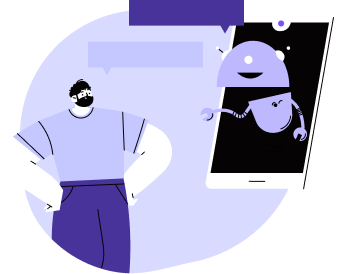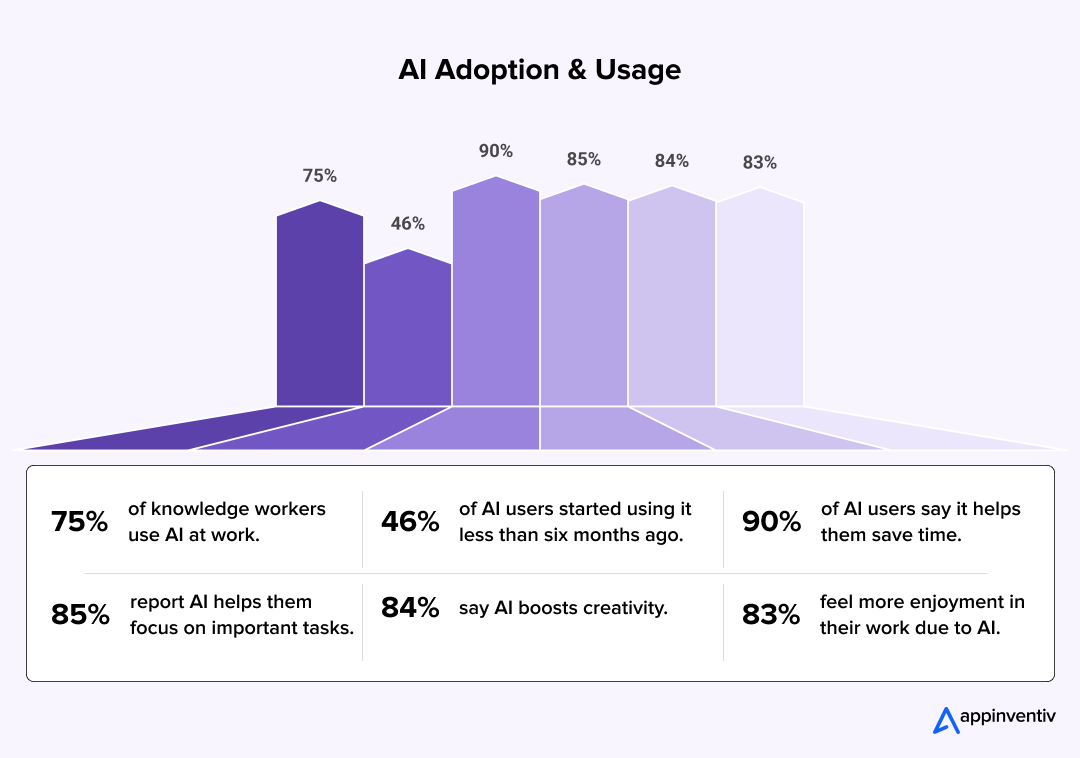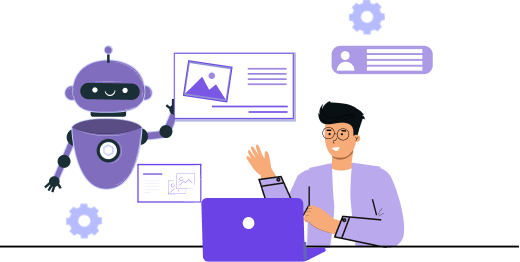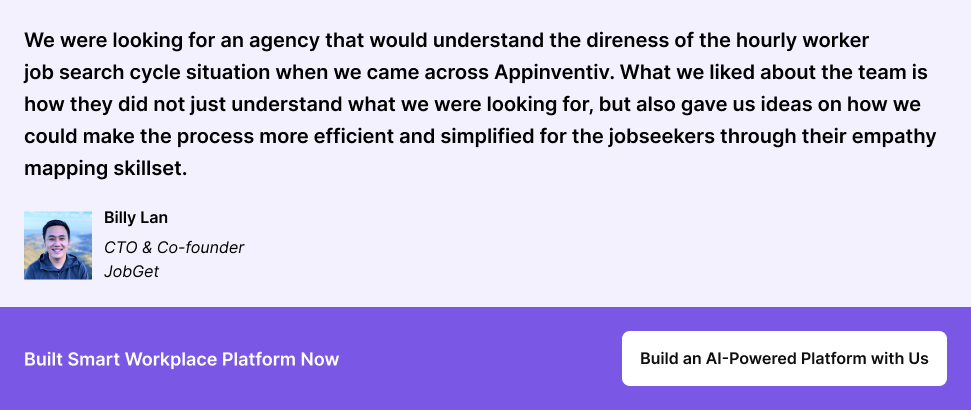- The Immeasurable Advantages: How AI in the Workplace is Reshaping the Experience
- Boosting Productivity and Efficiency
- Minimizing Errors and Operational Costs
- Analyzing Vast Datasets for Decision Making
- Driving Revenue Growth
- Improving Employee Experience and Well-being
- Driving Innovation at Scale
- AI in Action: Transformative Use Cases Across Industries
- Revolutionizing IT Processes
- Elevating Customer Service Workflows: Human + AI Partnership
- Optimizing Supply Chains
- Streamlining Human Resources and Talent Management
- Boosting Sales and Marketing Efforts
- Revolutionizing Finance and Accounting
- Ethical Considerations for AI Workflow Automation & How to Address Them
- Protecting Data Privacy and Security
- Tackling AI Bias Head-On
- Finding the Right Balance with Job Displacement
- Overcoming Employee Resistance
- Paving the Way for AI Success: Best Practices for Deploying AI in the Workplace
- Start Small, Think Big
- Define Clear Objectives
- Prioritize Data Quality
- Facilitate a Culture of AI Literacy
- Ensure Ethical AI Development and Use
- Integrate AI Thoughtfully with Existing Systems
- Measure and Iterate
- Partner with Expertise
- The Future of the AI-Driven Workplace
- Humans and AI Working Together
- Jobs Will Change, Not Disappear
- Predictive Analytics Transforms Workplace Management
- Hybrid Work Gets Smarter
- Digital Workforce Augmentation Becomes Standard
- Why Partner with Appinventiv for the Integration of AI in the Workplace
- FAQs
Key takeaways:
- Smart automation is not replacing humans; it is making their work smarter, faster, and better.
- The biggest wins in businesses come from AI-human partnerships, not AI replacements.
- Early AI adopters are pulling ahead with faster innovation and happier employees.
- Successful rollouts need careful planning around ethics, training, and gradual implementation.
- On average, the cost of AI implementation in the workplace ranges between $40,000 and $400,000 or more.
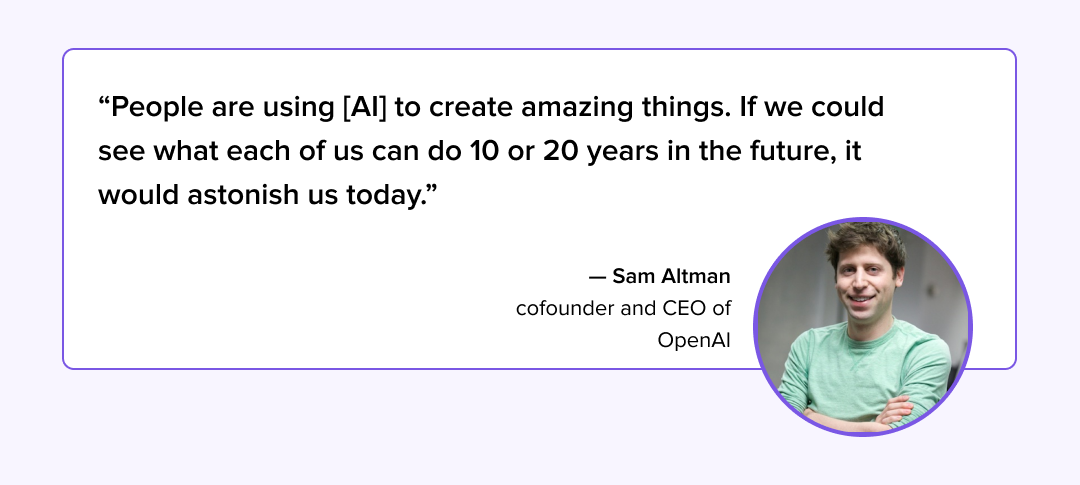
Remember when we all worried that robots would steal our jobs? That fear seems almost quaint now. Walk into any forward-thinking company today, and you will see AI’s prevalence all around. AI in the workplace isn’t pushing employees out; rather, it is pulling them up.
Take what happened at Salesforce last year. After rolling out their Einstein AI platform across departments, something unexpected occurred. Instead of layoffs, they hired 3,300 more employees. Why? Because when AI handled the routine stuff, their teams suddenly had bandwidth for the creative work that actually drives business growth.
Examples like this are not rare. The modern business world is flooded with numerous such stories. According to McKinsey’s 2025 report, over 92% of companies plan to increase their AI investments in the coming three years.
The old narrative was simple: automation meant job losses. But the new reality is a job upgrade. Smart companies are discovering that the right AI implementation doesn’t just streamline operations; it unleashes human creativity and collaboration in ways we never imagined possible.
In this blog, we will discuss how businesses across industries are leveraging AI workflow automation in the workplace.
Don’t get left behind. Learn how you can capitalize on this AI trend now!
The Immeasurable Advantages: How AI in the Workplace is Reshaping the Experience
The advantages of AI in the modern workplace are multifaceted, driving both efficiency and innovation. It redefines the way businesses and employees operate. Let’s break down some of the key advantages AI brings to the table.
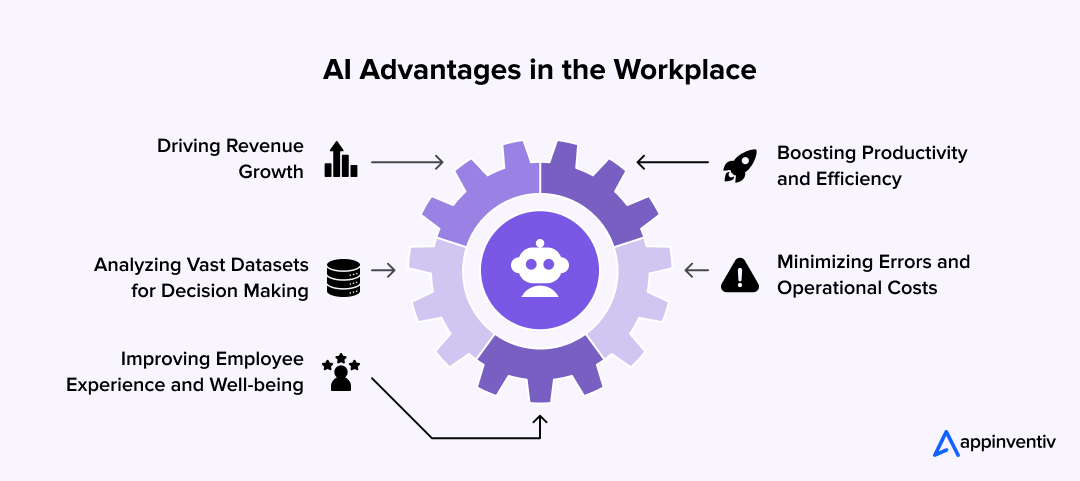
Boosting Productivity and Efficiency
At its core, AI workplace automation aims to handle repetitive and rules-based tasks. For instance, AI in digital marketing can instantly sift through thousands of emails and prioritize the most critical ones, and even generate the revert response in a jiffy.
This type of automation means your team can get free from the tedious, time-consuming tasks and invest that time in more value-driven work.
According to a McKinsey Global Survey in 2025, a significant number of organizations are already witnessing organization-wide, bottom-line impact from their gen AI use.
Minimizing Errors and Operational Costs
“To err is human,” but AI is not. Humans are prone to make mistakes when doing repetitive and data-intensive tasks. But AI can execute even the trickiest task with near-perfect precision. So, AI in the modern workplace helps reduce errors, which in turn cuts operational costs and mitigates risk.
For instance, AI in banking and finance can flag fraudulent transactions in real time. This predictive and proactive approach can help save millions in potential losses and downtime.
Analyzing Vast Datasets for Decision Making
In the modern business world, there is no place for guesswork because even a simple inefficiency in making decisions can result in major revenue losses. Thus, every decision you make must be backed by verified data. However, analyzing the vast troves manually for every decision is not possible.
AI excels at processing and analyzing massive datasets to uncover hidden patterns and insights. From understanding customer behavior to forecasting demands, AI provides the intelligence insights for critical decision-making.
Driving Revenue Growth
Let’s talk money. AI automation in business processes is not just about cutting costs (though it does that too). The real benefit lies in doing things that were not previously possible.
For instance, AI automation in business processes gives organizations the bandwidth to focus on innovation. Whether it is developing new products, enhancing customer services, or entering new markets, workplace AI solutions for business help create new opportunities for revenue growth.
According to the PwC June 2025 report, Industries more exposed to AI witness 3x higher growth in revenue per employee.
Improving Employee Experience and Well-being
Here’s something that surprised everyone: the right implementation of AI doesn’t make work feel more robotic; rather, it makes it feel more human. How?
When AI-enhanced collaboration tools for teams handle the repetitive stuff, employees spend more time on creative projects, reasoning, planning, and collaboration. This improves job satisfaction and reduces burnout. This leads to improved employee engagement, well-being, and a more productive workforce.
The reason is simple: AI removes the friction that used to eat up entire days. No more manually updating 47 different spreadsheets. No more sitting through meetings that could have been handled by intelligent routing. No more losing good ideas in email chains that span three departments.
Microsoft’s 2024 Work Trend Index Annual Report reveals that employees are eager for AI in the workplace and are not waiting for companies to catch up.
Driving Innovation at Scale
Digital workforce augmentation has basically turned innovation into a superpower. Remember when launching a new product took years? Now teams can brainstorm on Monday, prototype by Wednesday, and have customer feedback rolling in by Friday.
For instance, Netflix’s recommendation engine is good at telling you what to binge-watch next. Their AI actually helps writers and producers figure out which storylines will hook audiences while their competitors are still guessing what viewers want.
AI in Action: Transformative Use Cases Across Industries
Undoubtedly, the benefits of AI in the workplace are compelling. But its true power is best understood through its practical applications. AI in the business is transforming virtually every sector, automating repetitive tasks, streamlining operations, enhancing customer interactions, upskilling employees, and empowering companies. Here are some key use cases where the AI workplace is making an impact:
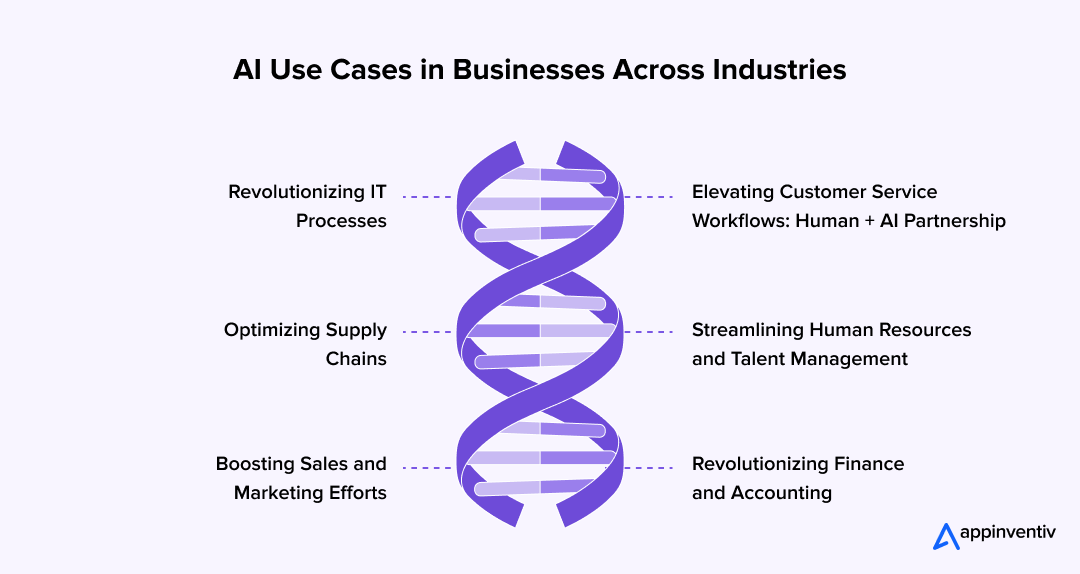
Revolutionizing IT Processes
Smart workplace platforms in IT operations are doing things that would have required entire teams just a few years ago. But we are not talking about simple script automation here; this is intelligent systems that learn, predict, and adapt. For instance:
- AI in manufacturing can predict equipment failure before it occurs.
- AI-powered chatbots and virtual assistants handle routine support queries, freeing IT staff to focus on more complex issues.
- AI in cybersecurity helps identify and respond to threats in real-time, often faster than human analysts.
This proactive approach significantly enhances system reliability and security.
Elevating Customer Service Workflows: Human + AI Partnership
Modern AI collaboration platforms for businesses in customer service create seamless handoffs between AI efficiency and human empathy.
Here is how AI and human agents work in collaboration: AI handles the initial interaction, instantly accesses customer history, identifies the issue, and either resolves it immediately or routes it to the human agent with full context already provided. The customer never repeats their story, and the agent starts every conversation fully informed.
Optimizing Supply Chains
AI-powered collaboration systems in supply chain management create visibility that seemed like science fiction a few years back. These systems track where things are, predict where problems may emerge, and automatically adjust to prevent them.
For instance, Walmart’s recent supply chain AI deployment analyzes weather patterns, social trends, local events, and historical data to predict demand fluctuations with utmost accuracy. This helps them steer clear of stockouts and overstock situations.
Also Read: The Role of Artificial Intelligence in Supply Chain Management
Streamlining Human Resources and Talent Management
AI in human resource management helps find, develop, and retain talent. Modern HR AI screens resumes, identifies potential, predicts success, and suggests development paths that align individual growth with business needs.
The bias reduction aspect proves particularly powerful. Despite best intentions, traditional hiring processes often reflect unconscious biases. But AI systems focus purely on skills, potential, and the right fit while removing demographic factors from initial screening processes.
Boosting Sales and Marketing Efforts
AI tools for hybrid work models in sales and marketing are enabling personalization at scale that was previously impossible. Instead of broad campaigns hoping to hit the right audience, AI enables micro-targeted approaches that speak directly to individual customer needs and preferences.
Modern AI analyzes behavioral patterns, engagement history, purchase timing, and even seasonal preferences. This helps employees predict what customers might buy, when they are most likely to buy, and through which channels they prefer to engage.
Also Read: AI for Enterprise – Transforming Business with Intelligence
Revolutionizing Finance and Accounting
AI in the FinTech landscape is making a boom. This helps the workforce with critical tasks like fraud detection, risk assessment, and financial forecasting. AI algorithms can identify suspicious transactions in real time, preventing costly thefts and financial losses in real time.
In accounting, AI automates invoice processing, expense categorization, and reconciliation. This helps free up accounting professionals’ time so that they can further invest in financial planning.
Ethical Considerations for AI Workflow Automation & How to Address Them
While the benefits of AI in the modern workplace are undeniable, its widespread adoption also inculcates some ethical considerations. Addressing these challenges proactively is essential for building trust, ensuring fairness, and maximizing the positive impact of AI.
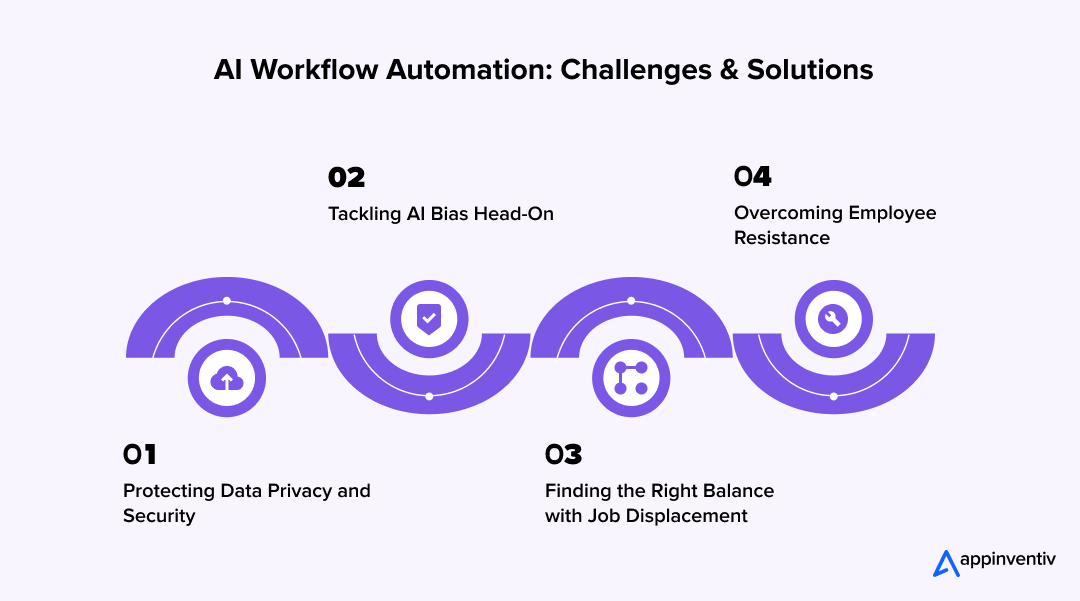
Protecting Data Privacy and Security
AI systems handle enormous volumes of sensitive information, such as employee personal data, confidential business intelligence, and so on. With vast troves of data comes some serious privacy vulnerabilities that organizations must address.
Solutions include:
- Deploy advanced encryption protocols
- Adhere to AI compliance and data privacy regulations like GDPR and CCPA
- Implement policies for transparent data collection and usage
- Conduct regular security audits
Tackling AI Bias Head-On
AI algorithms generate the output based on the data they are trained on. For instance, if historical datasets contain discriminatory patterns, AI systems will replicate and amplify these biases.
Solutions include:
- Use diverse, representative training datasets
- Monitor AI outputs for discriminatory patterns
- Train the team in bias identification and elimination
- Establish fairness metrics and regular bias testing
Finding the Right Balance with Job Displacement
The “AI replacing humans” fear oversimplifies reality. While AI workplace automation affects certain roles, it simultaneously creates new positions that require human creativity, oversight, and thinking.
Solutions include:
- Launch aggressive reskilling and upskilling programs
- Focus training on data literacy and critical thinking
- Position AI as capability enhancement rather than a replacement
- Create pathways for career evolution alongside technology
Overcoming Employee Resistance
Technological change often triggers resistance due to job security fears, complexity concerns, or surveillance worries.
Solutions include:
- Communicate a clear rationale for AI implementation
- Include employees in planning and feedback processes
- Provide comprehensive training programs
- Highlight mundane task elimination benefits
Also Read: The Most Profitable AI Business Ideas for 2026: Complete Guide
The future of business is AI-powered. Don’t wait for AI to catch up with you. Start leveraging its power today to drive productivity, collaboration, and business growth.
Paving the Way for AI Success: Best Practices for Deploying AI in the Workplace
Getting AI right in your organization is not just about throwing money at the newest tech and crossing your fingers. There are plenty of companies that stumble because they rushed in without a game plan. The ones that succeed? They take a different approach entirely.
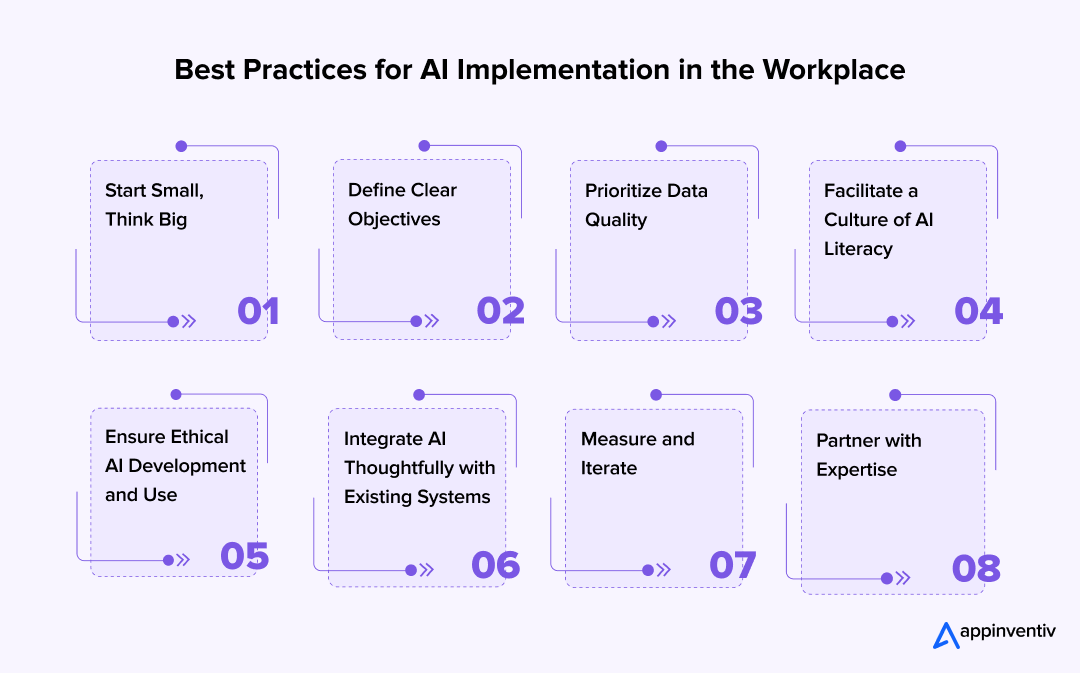
Start Small, Think Big
When you know what AI in the workplace can do, the urge to transform everything at once is real. But the companies that try to boil the ocean usually end up with a mess. Pick one nagging problem that keeps your team up at night.
Maybe it’s those weekly reports that eat up half your Friday, or customer inquiries that pile up faster than you can handle them. Test AI there first. Learn what actually works, then build from there. Companies that try to do everything right away usually end up with expensive headaches.
Define Clear Objectives
Before you even talk to vendors, sit down and hash out exactly what success looks like. Are you trying to shave hours off mundane tasks? Improve the speed at which you respond to customers? Cut down on operational headaches? Get specific with numbers if you can. “Better efficiency” means nothing, but “reducing report generation time from 4 hours to 30 minutes” gives everyone something concrete to work toward.
Prioritize Data Quality
Your data probably is not as clean as you think. Duplicate entries, inconsistent formats, outdated information, etc., all of this junk gets fed into your system and comes back as junk results only. Spend time upfront getting your data organized. It’s boring work, but it prevents expensive problems later.
Facilitate a Culture of AI Literacy
Most of the ideas of AI come from movies, which is not helpful when you’re trying to implement real workplace tools. Take time to educate your team about what AI actually does versus what Hollywood says it does. Show them real examples of how it’ll make their jobs easier, not scarier. The goal isn’t turning everyone into data scientists, but helping them understand enough to use these tools confidently.
Ensure Ethical AI Development and Use
Ethics can’t be an afterthought. Build privacy protection and fairness checks into your process from day one. Set up regular reviews to catch problems early. For important decisions like hiring, performance reviews, and customer issues, always keep people in the final loop.
Integrate AI Thoughtfully with Existing Systems
New tools need to work with what you already have. AI-enhanced collaboration tools for teams can kill enthusiasm and fail to achieve the intended outcome at its best if it is unable to talk to the existing system. Thus, before you commit to anything, make sure it integrates efficiently with your current software and doesn’t force your team to learn completely new workflows.
Measure and Iterate
Implementation day isn’t the finish line. Track how things perform against your original goals. Talk to the people using these tools daily. What’s working? What’s frustrating? Be ready to adjust based on actual feedback, not just what looked good on paper.
Partner with Expertise
Unless you have AI specialists on staff, you will need outside help. Find an AI development company that has done this before. They can help you avoid common mistakes and get up and running faster than trying to figure it out yourself.
The Future of the AI-Driven Workplace
We’re watching workplaces change faster than ever, and AI sits right in the middle of it all. As the 2024 Work Trend Index Annual Report from Microsoft and LinkedIn unveils, 75% of individuals are already using AI at work, and 79% of leaders agree that AI adoption is critical to remain competitive. Here’s where things are headed based on what we’re already seeing.
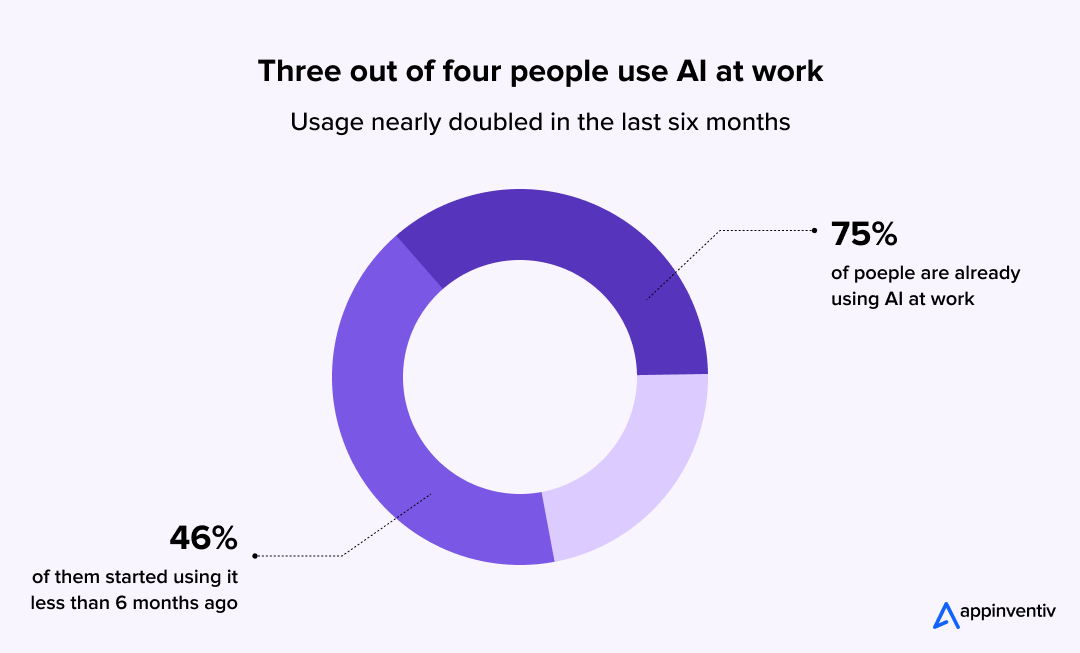
Humans and AI Working Together
Forget the robot takeover narrative. The real future is humans and AI as teammates. Doctors already use AI for diagnosis while they handle patient care. Financial advisors let AI crunch numbers while they build client relationships. This partnership model is spreading everywhere.
Your future workday might start with an AI assistant that’s learned your patterns when you’re sharpest for creative work, when you prefer handling emails, what kind of environment helps you focus best. It handles the routine stuff so you can tackle problems that actually need human thinking.
Jobs Will Change, Not Disappear
Sure, some roles will vanish with smart workplace platforms. Data entry clerks and basic analysts might find their work automated away. But we’re also seeing entirely new jobs emerge, such as AI trainers, algorithm auditors, and human-AI interaction specialists. Someone needs to teach these systems, monitor them for potential problems, and assist users in working with them effectively.
The winners will be those who learn to use AI tools while developing skills machines can’t replicate: creative problem-solving, emotional intelligence, ethical reasoning, and complex relationship management.
Predictive Analytics Transforms Workplace Management
Tomorrow’s offices won’t just react to problems; they will see them coming. Systems will predict when equipment needs maintenance, spot employee burnout weeks early, and automatically adjust everything from lighting to meeting schedules based on actual usage patterns.
Companies are already testing AI that monitors energy consumption to reduce costs, analyzes team communication to improve dynamics, and identifies engagement issues before they become retention problems. In the coming years, AI will not only be about surveillance; it will be about creating workplaces that actually support how people perform best.
Hybrid Work Gets Smarter
Remote work revealed an uncomfortable truth: virtual participants often get second-class treatment in meetings. AI is starting to fix this with tools that automatically balance audio levels, ensure equal speaking time, and keep remote workers as informed as their office colleagues.
Next-generation platforms will make location irrelevant to participation and career advancement. AI assistants will help bridge the gap between in-person and virtual experiences, ensuring everyone has equal access to information and opportunities.
Digital Workforce Augmentation Becomes Standard
AI handles the tedious stuff nobody wants to do anyway, like data analysis, routine customer service, and meeting transcription. This frees employees for work requiring human judgment: relationship building, complex problem-solving, and strategic decisions.
Success depends on learning to direct AI tools effectively rather than competing with them. The most valuable workers will be those who master this collaboration, treating algorithms as digital teammates rather than threats.
The workplace is transforming rapidly. Organizations that blend technology with human creativity will dominate those still clinging to outdated models.
Why Partner with Appinventiv for the Integration of AI in the Workplace
The workplace revolution is here, and it’s intelligent. Smart companies are not waiting to see what happens. They’re not just diving in now, but they’re doing it right, with proper planning, ethical safeguards, and a focus on helping their employees succeed alongside new AI trends.
It is high time to embrace the power of AI for collaboration in the workplace and allow Appinventiv to be your partner in building a future-ready, AI-driven enterprise that thrives on efficiency, innovation, and enhanced human potential. We provide comprehensive AI services and solutions that make a real impact.
What We Actually Do
- Build fully compliant intelligent automation systems
- Create predictive tools that spot problems before they happen
- Develop AI in employee collaboration platforms that actually work
- Follow responsible AI practices to ensure your AI stays fair and unbiased
- Regularly monitor and maintain your AI systems
Numbers That Speak Volume of Our Unmatched Excellence in AI Development
- Over 3000+ projects completed successfully, which include over 300 AI projects
- Team of 1,600+ skilled tech nerds with in-depth knowledge in emerging AI trends
- Clients across manufacturing, healthcare, finance, and beyond
Award-Winning Excellence: In our 10+ years of industry experience, we have earned numerous awards and achievements. This includes but is not limited to Deloitte’s Tech Fast 50 Awards in 2023 and 2024, Economic Times’ recognition as a Leader in AI Product Engineering & Digital Transformation, No. 1 app development company by Clutch, and so on.
Proven Results: Our work with JobGet shows what’s possible when you understand real user problems. We didn’t just build another AI-driven job platform; we revolutionized how hourly workers find employment. By creating resume-like profiles and location-based matching, we cut job search time from days to minutes.
The results?
- $52 Million Series B Funding Received
- 2 Million+ Mobile App Downloads
- 50,000+ Active Companies on the Platform
- 150,000+ Jobseekers Placed
The AI train is leaving the station. Companies jumping on now will dominate their industries. Those still debating will be playing catch-up for years. Ready to get started? Let’s start and elevate your AI journey now.
FAQs
Q. How does AI improve workplace collaboration?
A. AI improves workplace collaboration by automating communication summaries, translating languages in real-time, facilitating brainstorming, and providing intelligent insights from shared data.
AI-enhanced collaboration tools for teams help share information more effectively, understand complex topics quickly, and work together more synchronously, especially in hybrid or remote settings.
Q. What are the benefits of AI automation in the workplace?
A. The payoffs of AI tools for workplace collaboration are pretty straightforward. Here is how:
- AI in the workplace gets tasks done faster, cheaper, and with fewer mistakes.
- When AI automation in business processes takes over routine tasks, employees stop wasting time on data entry and report generation.
- With AI workflow automation, operating costs drop while accuracy improves.
- Your staff gets freed up time that they can invest in more value-driven work that requires human judgment and creativity.
Automating repetitive tasks means your team can focus on solving real problems instead of pushing papers, which naturally boosts AI in workplace productivity.
Q. How can AI transform modern work environments?
A. The transformation that AI workplace efficiency enables is visible everywhere in the following ways:
- Work environments shift from task-focused to strategy-focused when AI handles the routine operations.
- Employees spend time on innovation, relationship building, and complex problem-solving instead of manual processes.
- Decision-making improves dramatically with instant access to analyzed data and trend predictions.
- AI tools for hybrid work models make it possible for teams to collaborate effectively regardless of location or schedule.
Q. What AI tools are best for workplace collaboration?
A. The best AI tools for workplace collaboration often include intelligent meeting assistants for transcription and summarization. This includes AI-powered project management platforms that assign tasks and track progress, real-time translation tools, and advanced analytics platforms that unify data for shared decision-making. These AI-powered collaboration systems help eliminate friction and speed up results.
Q. How does AI redefine teamwork in the workplace?
A. AI redefines teamwork by acting as an intelligent assistant to every team member. It streamlines communication, automates administrative burdens, provides data-driven insights for shared projects, and helps identify skill gaps or resource needs.
This allows for more focused and effective employee collaboration, which leads to improved productivity and better outcomes.
Q. What does AI workplace implementation typically cost?
A. Implementation costs for AI in the workplace vary significantly based on scope and complexity. On average, the cost of AI product development for the modern workplace ranges between $40,000 and $400,000 or more.
The cost-driving factors include, but are not limited to, the number of users, integration complexity with existing systems, customization requirements, and ongoing maintenance needs.
Though the AI model development and implementation costs seem high initially, the rewards it pays off are huge. Most organizations see ROI within 12-18 months through reduced operational costs and increased productivity.
Q. How long does it take to implement AI in the workplace?
A. The timeline for AI implementation in the workplace typically falls somewhere between 4 months and 1 year or more, depending on project complexity and organizational readiness.
Contact us to get a more precise estimate for AI in the workplace implementation timeline.
Q. How do you develop and integrate AI solutions for workplace use?
A. Here is a step-by-step process of AI solution development and integration for the modern workplace:
- Start by pinpointing exact problems you want to solve – don’t try to fix everything on day one
- Assess your current data quality and get it organized before building anything
- Pick the right AI tech that actually matches your specific needs
- Hire an AI agent development company to build or customize solutions through iterative development cycles
- Test thoroughly with small pilot groups who can provide honest feedback
- Roll out gradually across departments with proper training at each stage
- Plan integration carefully so new tools work with your existing software stack
- Maintain strict security protocols throughout the entire implementation process


- In just 2 mins you will get a response
- Your idea is 100% protected by our Non Disclosure Agreement.
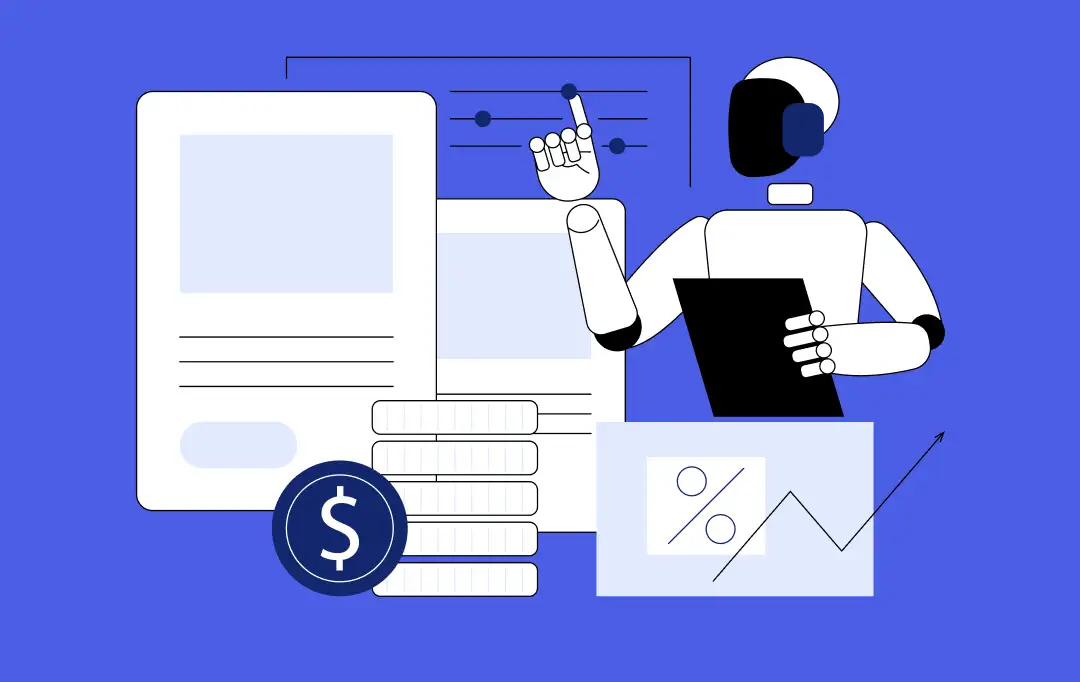
Data Mesh vs Data Fabric: Which Architecture Actually Scales With Business Growth?
Key takeaways: Data Mesh supports decentralized scaling, while Data Fabric improves integration efficiency across growing business environments. Hybrid architectures often deliver flexibility, governance, and scalability without forcing premature enterprise-level complexity decisions. Early architecture choices directly influence reporting accuracy, experimentation speed, and future AI readiness across teams. Phased adoption reduces risk, controls costs, and allows architecture…
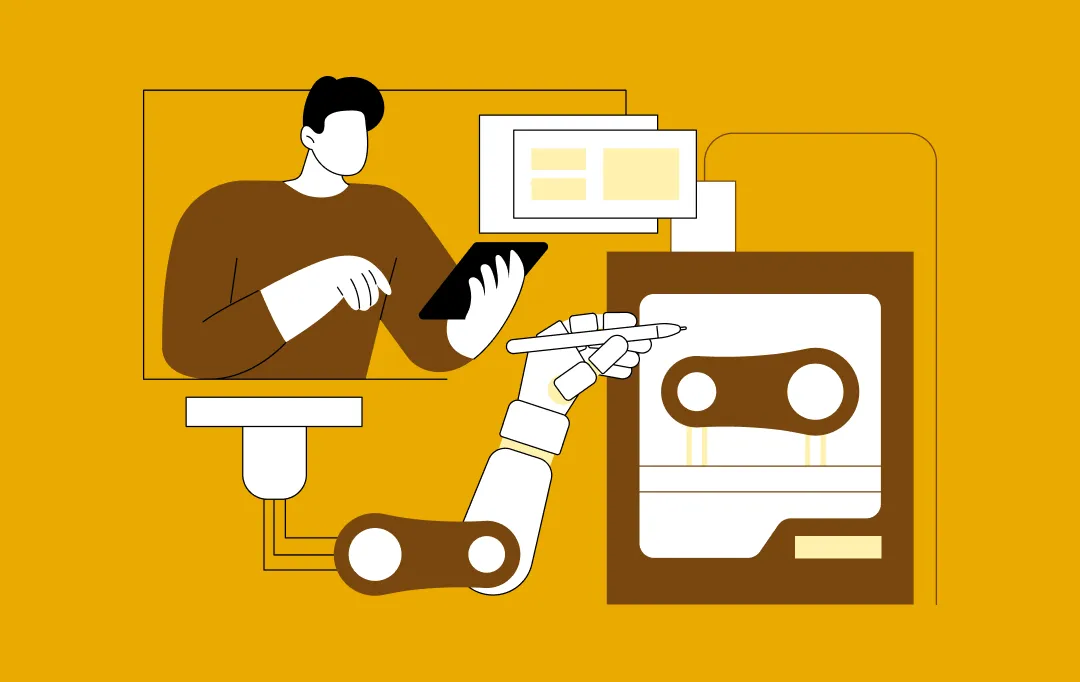
Governance vs. Speed: Designing a Scalable RPA CoE for Enterprise Automation
Key takeaways: Enterprise RPA fails at scale due to operating model gaps, not automation technology limitations. A federated RPA CoE balances delivery speed with governance, avoiding bottlenecks and audit exposure. Governance embedded into execution enables faster automation without introducing enterprise risk. Scalable RPA requires clear ownership, defined escalation paths, and production-grade operational controls. Measuring RPA…
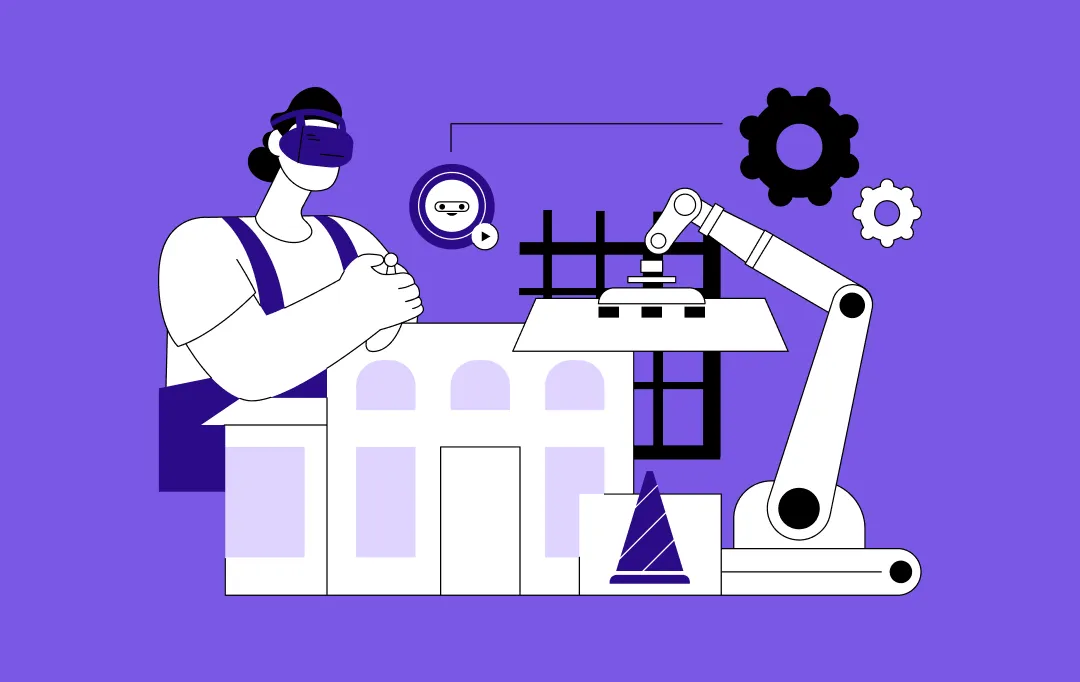
How AI Overhauling Industrial Automation in Australia
Key takeaways: AI is shifting industrial automation from rule-based to data-driven decision ecosystems Predictive and autonomous operations are improving efficiency and cost optimisation Australian industries are leveraging AI to solve workforce, sustainability, and compliance challenges Enterprises adopting AI early gain competitive, operational, and economic advantages Industrial automation in Australia is no longer just an engineering…






















